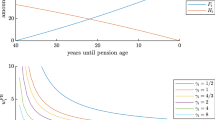Summary
The stock market collapse led to political tensions between generations due to the fuzzy definition of the property rights over the pension funds’ wealth. The problem is best resolved by the introduction of generational accounts. Modern consumption and portfolio theory shows that the younger generations should have the higher equity exposure due to their human capital. Stock market losses should be distributed smoothly over lifetime consumption by adjusting both current contributions and future entitlements. We present expressions for the substantial welfare losses involved in various practically relevant deviations from the optimal system.
Similar content being viewed by others
References
A. Auerbach L. Kotlikof (1987) Dynamic fiscal policy Cambridge University Press Cambridge
D.K. Backus P.J. Kehoe F.E. Kydland (1995) International Business cycles: Theory and Evidence T.F. Cooley (Eds) Frontiers of Business Cycle Research Princeton University Press Princeton 331–356
R.W.J. Beetsma P.C. Schotman (2001) ArticleTitle‘Measuring Risk Attitudes in a Natural Experiment: Data from the Television Game Show Lingo’ Economic Journal 111 821–848 Occurrence Handle10.1111/1468-0297.00661
Z. Bodie R.C. Merton W.F. Samuelson (1992) ArticleTitle‘Labor Supply Flexibility and Portfolio Choice in a Life Cycle Model’ Journal of Economic Dynamics and Control 16 427–449 Occurrence Handle10.1016/0165-1889(92)90044-F
Cambell, J.Y. (1999), ‘Asset prices, Consumption, and the Business Cycle,’ in: J. Taylor and M. Woodford, (eds.), Handbook of Macroeconomics, Vol. 1C, ch. 19, Amsterdam, North Holland
T.F. Cooley E.C. Prescott (1995) ‘Economic Growth and Business Cycles’ T.F. Cooley (Eds) Frontiers of Business Cycle Research Princeton University Press Princeton 1–38
E. Dimson P. Marsh M. Staunton (2002) Triumph of the Optimists, 101 Years of Global Investment Returns Princeton University Press Princeton
P.H. Dybvig (1988) ArticleTitle‘Inefficient Dynamic Portfolio Strategies or how to Throw away a Million Dollars in the Stock Market’ Review of Financial Studies 1 67–88
Judd Hendricks Kovenock (1980) ArticleTitle‘A Note on the Core of the Overlapping Generations Model’ Economics Letters 6 95–97 Occurrence Handle10.1016/0165-1765(80)90063-4
Menoncin, F. (2003), Optimal Real Investment with Stochastic Income: A Quasi-explicit Solution for HARA investors, Internal discussion paper, University Catholique de Louvain.
R.C. Merton (1969) ArticleTitle‘Lifetime Portfolio Selection Under Uncertainty, the Continuous Time Model’ Review of Economics and Statistics 51 247–257 Occurrence Handle10.2307/1926560
Newberry, D.M.G. and J.E. Stiglitz (1981), The Theory of Commodity Price Stabilization,Oxford, Claredon Press.
K.G. Rouwenhorst (1995) Asset pricing Implications of Equilibrium Business Cycle Models T.F. Cooley (Eds) Frontiers of Business Cycle Research Princeton University Press Princeton 294–330
P.A. Samuelson (1969) ArticleTitle‘Lifetime Portfolio Selection by Dynamic Stochastic programming’ Review of Economics and Statistics 51 239–246
Teulings, C.N. and C.G. de Vries (2003), ‘Pensioenbeleid als Automatische Destabilisator, ESB’ 51 p. 100–102 (in Dutch).
Author information
Authors and Affiliations
Corresponding author
Additional information
We are grateful to stimulating suggestions by Lans Bovenberg, Casper van Ewijk, Frank de Jong and by two anonymous referees.
Rights and permissions
About this article
Cite this article
Teulings, C.N., De Vries, C.G. Generational Accounting, Solidarity and Pension Losses. De Economist 154, 63–83 (2006). https://doi.org/10.1007/s10645-006-6486-y
Issue Date:
DOI: https://doi.org/10.1007/s10645-006-6486-y




